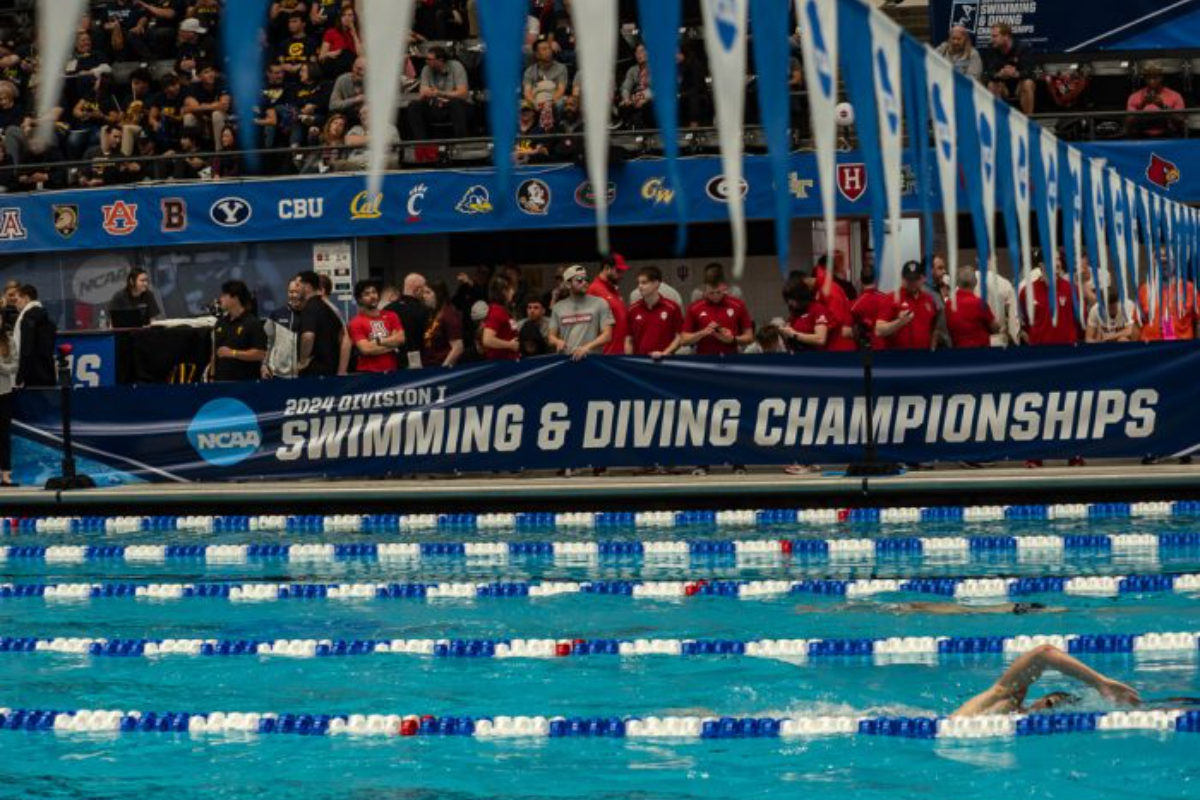
Imago
Credit: X/ NCAA Swimming

Imago
Credit: X/ NCAA Swimming
How does a team bounce back from a year of ups and downs as they prepare for the national stage? The Florida men’s swimming and diving team came into the 2025 NCAA Division I Championships on March 26 at the Weyerhaeuser King County Aquatic Center in Federal Way, Washington, with momentum from recent competitions and controversy right off the bat. Following a solid performance at the SEC Championships and a close warm-up at the Florida Invitational, the Gators hoped to continue their string of top-five NCAA finishes—only to have their 200 medley relay disqualified on Day 1, fueling heated debate among fans.
An X post by user @kylesockwell on March 26 that said, “Men’s NCAAs started 15 minutes ago and we already have drama—Florida DQ’d.” sparked immediate reactions. One fan said, “Yeah, that one was clear as day – classic case of the first-day adrenaline” while speculating the cause. The championships, lasting from March 26-29, have 235 swimmers and 35 divers competing to win. Favorites Tennessee came as the 200 medley relay was seeded in 1:20.50 with stars such as Jordan Crooks, with perennial favorite Florida looking to retake the limelight. In the last heat of the 200 medley relay, Florida’s Jonny Marshall (20.59), Julian Smith (22.14), Josh Liendo (19.08), and Scotty Buff (18.24) flashed to a time of 1:20.05—breaking the NCAA record of 1:20.15 held by Florida’s 2024 team.
The championships’ unpredictability now reigns. Tennessee’s depth, Cal’s legacy, and Florida’s resilience (if they rally) promise a thrilling week. Fans dissect every angle—some call it a travesty, others a fair shake.
Watch What’s Trending Now!
The Gators were disqualified due to an early takeoff by anchor
Scotty Buff, whose reaction time was recorded at -0.06, just outside the NCAA’s allowable threshold of -0.04. With Tennessee projected at 582 points and Cal at 548 based on pre-championship psych sheets, Florida’s 526.5 points kept them in contention, but losing up to 40 points from this key relay event—where precision is paramount—might shift the momentum decisively toward their rivals. The disqualification handed the win to Texas (1:20.28), while Tennessee’s strong showing kept them on the hunt.Additional DQs of the night included Virginia Tech and Michigan, highlighting the event’s razor-thin margins. Beyond the drama,
NCAA Swimming & Diving Championships Day 1 showcased talent. Yet, the spotlight lingered on Florida’s misfortune. Their psych sheet projected 182 relay points, the highest in the field—making this loss a gut punch. As the meet runs through March 29, Tennessee’s relay strength and Cal’s legacy loom large. Can Florida rally from this setback, or will the DQ define their week?Drama immediately at the 2025 Men’s NCAA Swimming & Diving Championships. Florida DQd.
— Kyle Sockwell (@kylesockwell) March 27, 2025
Fans respond to Florida’s disqualification
NCAA Swimming & Diving Championships Day 1 Finals confirmed Texas took the win, while Florida’s loss of up to 40 points stung their projected 526.5-point total, trailing Tennessee (582) and Cal (548). Fans quickly took to social media to vent. One fan commented, “Turns, starts, and finishes were sloppy from alotttttt of teams for that 2mr,” highlighting a larger trend of missteps that evening. SwimSwam reported Virginia Tech and Michigan also had DQs in previous heats, indicating the high-pressure stakes and close margins heightened mistakes throughout the field.Another fan wrote, “
This one hurt 😭,” capturing the emotional blow for Gator supporters. With 18 swimmers and divers qualified, as reported by FloridaGators.com, and a psych sheet projecting 182 relay points, expectations were sky-high. Losing a record-breaking swim—and potential title momentum—cut deep, especially after their 800 free relays set SEC and school records (6:02.50) in Knoxville.Speculation swirled around Buff’s early jump. One fan commented, “
Crazy cause he jumped early because of pure fear of getting caught👀,” suggesting nerves got the better of him. The relay’s fly-to-free exchange demands split-second timing, and Buff’s -0.06 reaction, logged by Hy-Tek per SwimSwam, was a hair too eager. Florida’s prep at the Florida Invitational likely honed such transitions, yet the pressure of NCAAs proved unforgiving.Not everyone concurred with the call. Another supporter posted, “
Live I didn’t think it was an early start at all. Slomo and pausing it I guess? But that’s not a DQ to me.,” criticizing the officiating. In real-time, the exchange appeared smooth, but slow motion caught the violation. The NCAA’s -0.04 threshold, intended for fairness, left little room for argument—though it didn’t dissuade fans from replaying past controversies, such as the 2023 women’s meet. One fan commented, “-.06 according to hy-tek So unfortunate man,” lamenting the precision that doomed Florida. The Hy-Tek timing system, a standard in NCAA meets, sealed their fate, a bitter pill after their SEC triumph.As the meet goes on through March 29, Florida’s depth—boosted by talents such as
Julian Smith (SEC 100 breast champion, 50.40)—holds out the promise of a turnaround. But this DQ has fans divided: some view it as a travesty, others as a good call. Will it stop the Gators or stoke their fire? The pool will tell.
